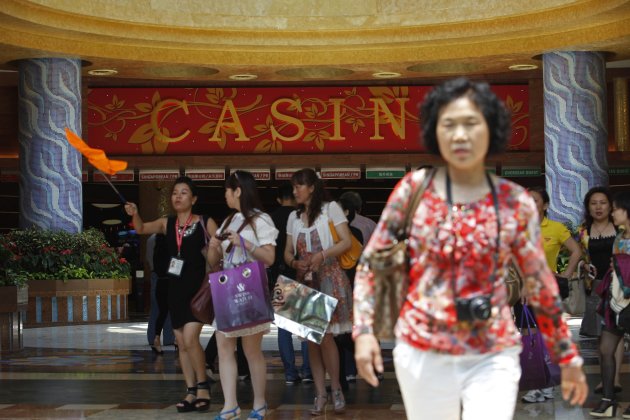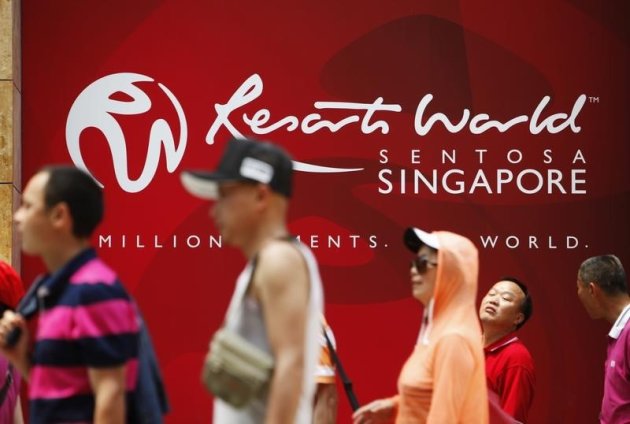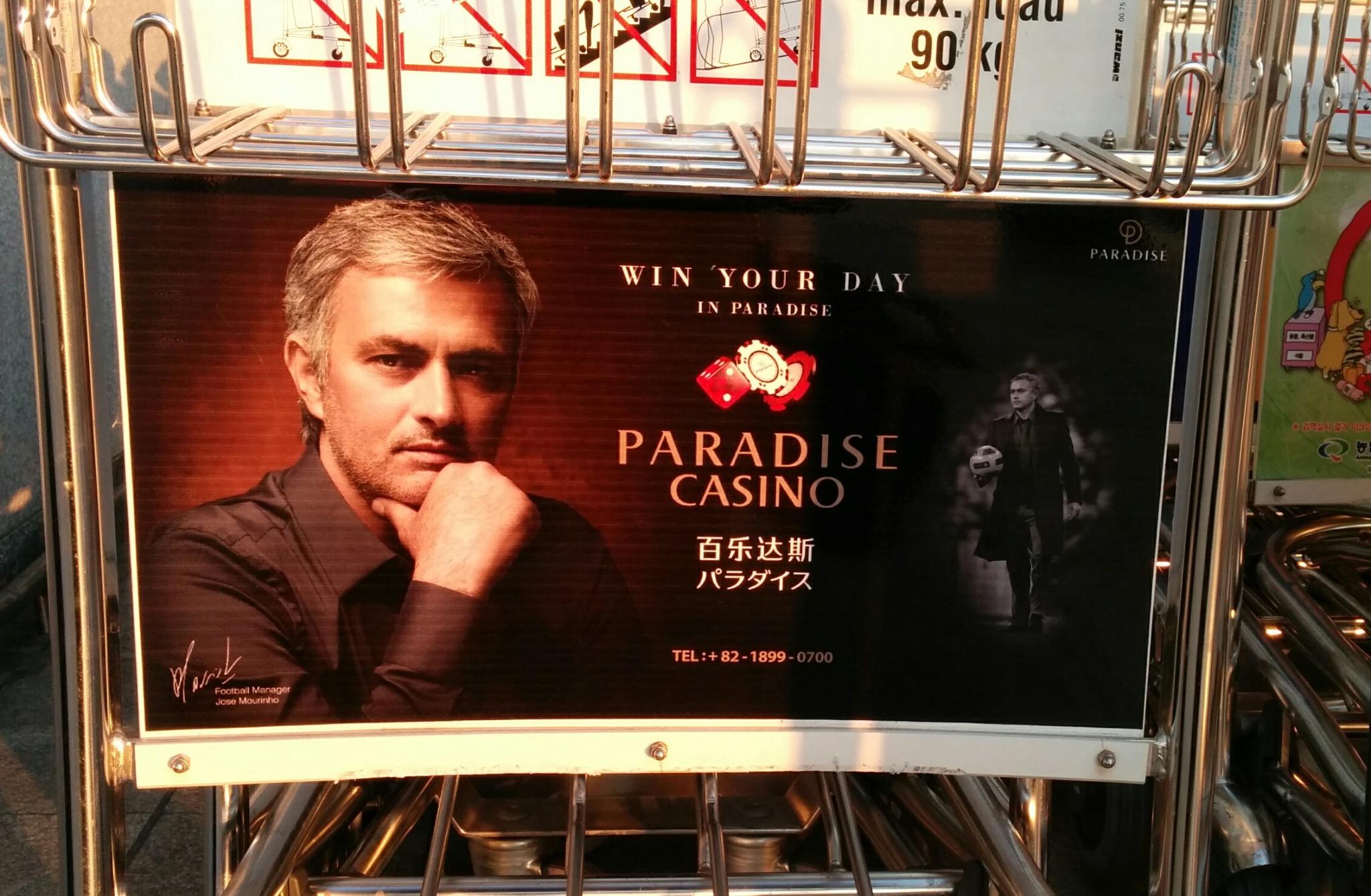Singapore casinos brace for battle as VIP volumes fall
 <cite class="byline vcard" style="font-style: normal; color: rgb(119, 119, 119); font-size: 12px; display: block; font-family: Georgia, Times, 'Times New Roman', serif; vertical-align: middle;">Reuters – <abbr title="2014-11-09T21:36:06Z" style="border: 0px;">Mon, Nov 10, 2014 5:36 AM SGT</abbr></cite>
<cite class="byline vcard" style="font-style: normal; color: rgb(119, 119, 119); font-size: 12px; display: block; font-family: Georgia, Times, 'Times New Roman', serif; vertical-align: middle;">Reuters – <abbr title="2014-11-09T21:36:06Z" style="border: 0px;">Mon, Nov 10, 2014 5:36 AM SGT</abbr></cite>

Reuters/REUTERS - Chinese tourists arrive at the lobby of Genting Singapore's Resorts World Sentosa casino in Singapore in this April 29, 2013 file photo. Singapore's two glitzy casinos are fighting …more
>
By Rachel Armstrong and Anshuman Daga
SINGAPORE (Reuters) - Singapore's two glitzy casinos are fighting for a shrinking pool of high rolling players as China's corruption crackdown and economic slowdown reduce the number of VIPs at their tables, and the battle is starting to turn ugly.
Gaming mogul Sheldon Adelson, whose Las Vegas Sands runs the Marina Bay Sands resort, has accused rival Genting Singapore's Resorts World Sentosa of relying on overly generous incentives and credit to entice big money players.
"Maybe one day, they will get used to competing on the basis of a quality product, if they ever build one, and they won't have to buy the business," he said during his company's earnings call last month.
A Genting spokeswoman declined to comment on questions sent by Reuters, citing the company's quarterly results due on Tuesday, but President Tan Hee Teck had acknowledged the headwinds facing Singapore's casinos during its last earnings call in August.
"I suppose some operators may not want to admit it, but at least from our side, we believe that the situation will continue to be quite challenging at least for the next 6 to 12 months," Tan said.
Behind the spat is a fall in the number of the high rollers who have been crucial to the billions of dollars the two casinos have earned since opening in 2010, making up around 50 percent of their combined S$6 billion (2.93 billion pounds) in annual gaming revenues.

People walk past a logo of Genting Singapore's Resorts World Sentosa in Singapore, April 29, 2013. REUTERS/Edgar …
Around half of that VIP business comes from customers from China, which is in the midst of an economic slowdown, while a crackdown on graft now in its second year is making it harder for wealthy Chinese to take money out of the country and discouraging conspicuous consumption.
Visitors from China were down 30 percent to 871,000 in the first half of 2014, according to Singapore's tourism board.
Last month, Las Vegas Sands reported a 34 percent fall in VIP volume business at Marina Bay Sands to $9.1 billion (5.73 billion pounds) in the quarter ending Sept. 30. Genting is expected to report a similar sharp slide in its third quarter results.
Genting Singapore shares have been the worst performer in the benchmark Straits Times index this year, falling 30 percent.
"Growth in Singapore gaming revenue has stalled, and is likely to contract slightly in 2014 with macroeconomic and political factors in China being the principal cause," Fitch Ratings wrote in a note on Oct. 31.
While the two casinos have been pushing to earn more money from non-gambling activities such as conference facilities, hotels and shopping, gaming still makes up around 80 percent of both their revenues. Both casinos boast profit margins of about 50 percent, the world's highest in the industry.
EASY CREDIT
Offering credit is an easy way to lure foreign players - the rules are stricter for Singaporeans - to play, and to play big. Commission, a small rebate on the amount of money rolled, can also be used to entice gamblers.
"Credit checks can be very fast for some gamblers – in 15 minutes or so you can probably get approval for $1 million, and with $1 million you can still roll up to $8 or $9 million," said Terence Tay, former general counsel for Genting Singapore who now runs a consultancy.
But credit collection is a thorny issue for Singapore casinos, which are already waiting on hundreds of millions of dollars in credit to be repaid by gamblers, the majority of whom are based overseas.
Genting has seen a 61 percent rise in its "trade and other receivables", or money owed by customers, to stand at S$1.2 billion in the quarter ending June 2014 from June 2012, while total revenue has increased by 7 percent in the same period.
In August, Genting Singapore President Tan said the company was prudent in managing its debt collections, citing a S$81 million ($62.5 million) impairment loss it had taken on its trade receivables in the second-quarter versus a S$32 million impairment loss a year-ago.
Las Vegas Sands said in its latest earnings presentation that its "gross casino accounts receivables" for Marina Bay Sands stood at $984 million at the end of September 2014, up 10 percent from September 2012.
In rival Macau, casinos rely on middlemen known as "junkets" to extend credit to high rollers and recover debts, but Singapore has very few junket operators.
Instead, the operators have to go after the money themselves - a tall order given their legal powers to enforce debt payments from VIP players overseas are limited.
Pleading letters, visits from marketing agents and notices of demand from external lawyers often fall on deaf ears. The casinos can deploy debt collection agencies, though often just physically locating the high roller can prove near impossible.
Another concern is that with new casinos opening in the rest of Asia, VIP players may be looking beyond Singapore to play.
"What's going to be the greater challenge to the Singapore operators, and certainly more longer-term, is that across the region, there's a lot more political momentum to legalize casinos," said Vicky Melbourne, head of industrials for Southeast Asia and Australasia ratings at Fitch.
(Reporting by Rachel Armstrong and Anshuman Daga; Editing by Alex Richardson)
 <cite class="byline vcard" style="font-style: normal; color: rgb(119, 119, 119); font-size: 12px; display: block; font-family: Georgia, Times, 'Times New Roman', serif; vertical-align: middle;">Reuters – <abbr title="2014-11-09T21:36:06Z" style="border: 0px;">Mon, Nov 10, 2014 5:36 AM SGT</abbr></cite>
<cite class="byline vcard" style="font-style: normal; color: rgb(119, 119, 119); font-size: 12px; display: block; font-family: Georgia, Times, 'Times New Roman', serif; vertical-align: middle;">Reuters – <abbr title="2014-11-09T21:36:06Z" style="border: 0px;">Mon, Nov 10, 2014 5:36 AM SGT</abbr></cite>
Reuters/REUTERS - Chinese tourists arrive at the lobby of Genting Singapore's Resorts World Sentosa casino in Singapore in this April 29, 2013 file photo. Singapore's two glitzy casinos are fighting …more
>
By Rachel Armstrong and Anshuman Daga
SINGAPORE (Reuters) - Singapore's two glitzy casinos are fighting for a shrinking pool of high rolling players as China's corruption crackdown and economic slowdown reduce the number of VIPs at their tables, and the battle is starting to turn ugly.
Gaming mogul Sheldon Adelson, whose Las Vegas Sands runs the Marina Bay Sands resort, has accused rival Genting Singapore's Resorts World Sentosa of relying on overly generous incentives and credit to entice big money players.
"Maybe one day, they will get used to competing on the basis of a quality product, if they ever build one, and they won't have to buy the business," he said during his company's earnings call last month.
A Genting spokeswoman declined to comment on questions sent by Reuters, citing the company's quarterly results due on Tuesday, but President Tan Hee Teck had acknowledged the headwinds facing Singapore's casinos during its last earnings call in August.
"I suppose some operators may not want to admit it, but at least from our side, we believe that the situation will continue to be quite challenging at least for the next 6 to 12 months," Tan said.
Behind the spat is a fall in the number of the high rollers who have been crucial to the billions of dollars the two casinos have earned since opening in 2010, making up around 50 percent of their combined S$6 billion (2.93 billion pounds) in annual gaming revenues.

People walk past a logo of Genting Singapore's Resorts World Sentosa in Singapore, April 29, 2013. REUTERS/Edgar …
Around half of that VIP business comes from customers from China, which is in the midst of an economic slowdown, while a crackdown on graft now in its second year is making it harder for wealthy Chinese to take money out of the country and discouraging conspicuous consumption.
Visitors from China were down 30 percent to 871,000 in the first half of 2014, according to Singapore's tourism board.
Last month, Las Vegas Sands reported a 34 percent fall in VIP volume business at Marina Bay Sands to $9.1 billion (5.73 billion pounds) in the quarter ending Sept. 30. Genting is expected to report a similar sharp slide in its third quarter results.
Genting Singapore shares have been the worst performer in the benchmark Straits Times index this year, falling 30 percent.
"Growth in Singapore gaming revenue has stalled, and is likely to contract slightly in 2014 with macroeconomic and political factors in China being the principal cause," Fitch Ratings wrote in a note on Oct. 31.
While the two casinos have been pushing to earn more money from non-gambling activities such as conference facilities, hotels and shopping, gaming still makes up around 80 percent of both their revenues. Both casinos boast profit margins of about 50 percent, the world's highest in the industry.
EASY CREDIT
Offering credit is an easy way to lure foreign players - the rules are stricter for Singaporeans - to play, and to play big. Commission, a small rebate on the amount of money rolled, can also be used to entice gamblers.
"Credit checks can be very fast for some gamblers – in 15 minutes or so you can probably get approval for $1 million, and with $1 million you can still roll up to $8 or $9 million," said Terence Tay, former general counsel for Genting Singapore who now runs a consultancy.
But credit collection is a thorny issue for Singapore casinos, which are already waiting on hundreds of millions of dollars in credit to be repaid by gamblers, the majority of whom are based overseas.
Genting has seen a 61 percent rise in its "trade and other receivables", or money owed by customers, to stand at S$1.2 billion in the quarter ending June 2014 from June 2012, while total revenue has increased by 7 percent in the same period.
In August, Genting Singapore President Tan said the company was prudent in managing its debt collections, citing a S$81 million ($62.5 million) impairment loss it had taken on its trade receivables in the second-quarter versus a S$32 million impairment loss a year-ago.
Las Vegas Sands said in its latest earnings presentation that its "gross casino accounts receivables" for Marina Bay Sands stood at $984 million at the end of September 2014, up 10 percent from September 2012.
In rival Macau, casinos rely on middlemen known as "junkets" to extend credit to high rollers and recover debts, but Singapore has very few junket operators.
Instead, the operators have to go after the money themselves - a tall order given their legal powers to enforce debt payments from VIP players overseas are limited.
Pleading letters, visits from marketing agents and notices of demand from external lawyers often fall on deaf ears. The casinos can deploy debt collection agencies, though often just physically locating the high roller can prove near impossible.
Another concern is that with new casinos opening in the rest of Asia, VIP players may be looking beyond Singapore to play.
"What's going to be the greater challenge to the Singapore operators, and certainly more longer-term, is that across the region, there's a lot more political momentum to legalize casinos," said Vicky Melbourne, head of industrials for Southeast Asia and Australasia ratings at Fitch.
(Reporting by Rachel Armstrong and Anshuman Daga; Editing by Alex Richardson)




